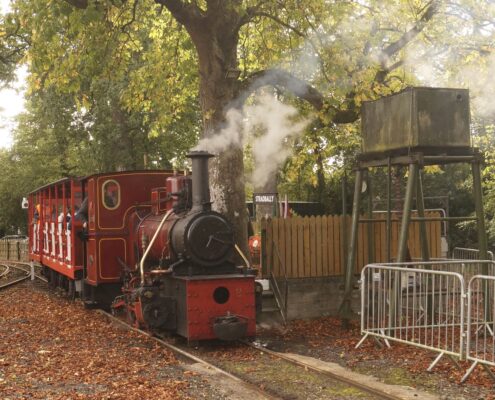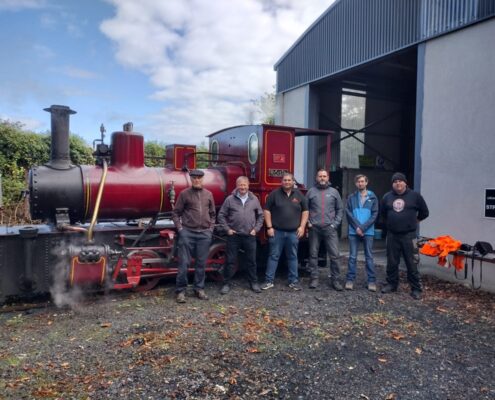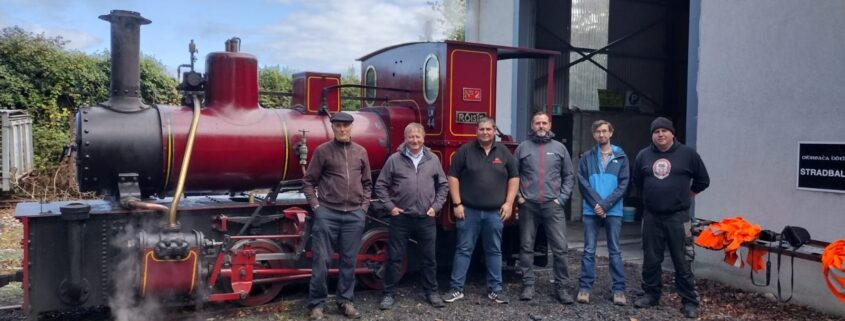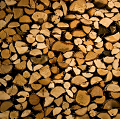PRESS RELEASE: First Irish trial of a new fuel for Heritage Railways a huge success – IrBEA
For immediate release – 14/10/2022
First Irish trial of a new fuel for Heritage Railways a huge success – IrBEA
Heritage is big business because the tourism industry is big business. Heritage sites have traditionally burned coal, from open fire grates in historic houses to steam locomotives, traction engines and stationary engines. So how can you de-carbonise this important part of the tourism industry and yet keep everything moving along? Recently the search has been on for a coal substitute that gives similar characteristics to coal but which does not add to the burden of carbon in the atmosphere from the burning of fossil fuels. Fortunately, and for historic reasons (not least the desire to move away from generating electricity from burning peat) Ireland is leading the way in this area.
On Saturday 24th September 2022, Ireland saw the first passenger train to be hauled by a steam locomotive using a 100% renewable biomass-based coal substitute. This was on the Stradbally Woodland Railway, a short narrow-gauge line with steep gradients. Being in woodland, the old saying ‘from small acorns do great oaks grow’ could be perfectly appropriate for this significant trial. The fuel used was a stove-ready commercial product called ‘Harvest Flame’ that is made via the process of torrefaction from biomass – in this case olive stones, a residue from the food industry. As that Saturday proved, this material is also suitable for small locomotives and traction engine boilers. So, Ireland’s original volunteer run heritage line has now also pioneered a first step towards carbon neutral steam heritage.
Nicola Glynn, secretary of the Irish Steam Preservation Society (ISPS) said: “We were excited to try this new form of fuel. Our railway and traction engine rally is in a beautiful part of Ireland, and doing our bit to help decarbonise the economy is important to us. Plus, our crews enjoyed not ending the day covered with coal dust, as this is a remarkably clean fuel.”
The ‘Continuity Biocoal’ project is a collaboration between the Irish Steam Preservation Society CLG, Arigna Fuels of Roscommon, The Irish Bioenergy Association (IrBEA) and their partners in Wales, the Severn Wye Energy Agency (SWEA), in the Interreg NWE funded THREE C Project. The initiative highlights the close working relationship between Ireland and Wales (which has many narrow-gauge steam railways of its own) made possible by participation in a series of European transnational projects, that have focussed on finding climate-friendly uses for low value, residual biomass over the last decade.
Peter Layden, Director of Arigna Fuels said: “Arigna Fuels are delighted to support the heritage steam industry, replacing the original fossil coal with Harvest Flame, our new biomass-sourced 100% renewable and sustainable fuel. Not only will this fuel help to drastically reduce the carbon footprint of the heritage sector, but it will also allow people to continue to enjoy first-hand the magnificent and historic engineering, a legacy of a different era.”
Stephen McCormack of IrBEA said: “IrBEA and its members continue to develop and promote sustainable forms of bioenergy. IrBEA is excited to be supporting this novel and innovative application of a fully sustainable biofuel in such an iconic use. The small steam engines of Ireland have played a very significant role in the development of energy production, industry and agriculture in our Island and it is important to keep this heritage alive whilst showing that a move to a bioenergy based, non-fossil fuel future is achievable. A new product for an old process, with much potential.”
The Continuity Biocoal project holds out the hope that much of our industrial heritage can avoid retirement to glass cases in a museum and continue to inform, educate, and give pleasure to future generations without damaging our environment further. The UK’s National Railway Museum is also closely following the lead taken by Ireland in this field. Heritage railways and other historic sites have so far helped the public to understand how our communities, culture and society were shaped by the fossil-fuel age; now they can tell the next chapter by showing how we can transition to a Net-Zero-Carbon future, by working together and working smarter. Saving our only home planet need not mean having to give up everything we enjoy.

Photo of the Heritage Railway locomotive at Stradbally, Co.Laois which is the 1st passenger heritage train powered by a 100% renewable biomass coal product. Photo Credit R. Gwynne

Group Photo: Pictured at the Heritage Railway in Stradbally, Co.Laois, at the trial of the new biocoal, are L-R, Bob Gwynne – National Railway Museum UK, Colin Keyse – Severn Wye, Nigel Glynn – Irish Steam Preservation Society, Robert Johnson – Arigna Fuels, Stephen McCormack – Irish Bioenergy Association (IrBEA), Sean Cain – Irish Steam Preservation Society. Photo Credit R. Gwynne
ENDS
********************************
Notes to editors
About Heritage Railways
The Irish Steam Preservation Society CLG, operate the Stradbally woodland railway as well as Ireland’s largest traction engine rally. There are currently six operational heritage railways in Ireland, with two others currently non operational and a further three planned. In the UK, 156 Heritage Railways and museums attract 13 million visitors a year and contribute £600 million to the UK economy. They also employ around 4000 people. Heritage steam machines burn approximately 35,000T of fossil coal per year in the UK all of which will very soon have to be imported.
The Irish Steam Preservation Society
The Irish Steam Preservation Society was formed by a group of Steam enthusiasts who set out to preserve for the good of the country, a part of national agricultural heritage, the Steam Traction engine and its many forms after a meeting of members at Harold Condell’s farm in Co. Laois in 1964. From a small gathering of engines held at the Market House in Stradbally on St Stephen’s day 1965, the society was formed and the National Steam Rally held on August Bank Holiday was established, which remains a highlight in the national and international Steam calendar and is the longest running Steam Rally in the country. 2019 saw the most steam engines ever gathered on the Island of Ireland for the 50th anniversary rally. In 1967 a short narrow gauge Steam Railway was added using a locomotive kindly donated by the Guinness Brewery with a passenger carriage. In 1969, tracks were re-laid to run the 3 ft gauge preserved Bórd na Móna locomotive. So we can proudly claim to be the only Traction Engine Rally in Ireland to have its own Steam Railway. The Stradbally Woodland Railway is the first volunteer-run heritage railway in Ireland. It runs every Bank Holiday weekend and selected other running days during the year. In June 1968 the “Steam Museum” was opened in Stradbally by P.J Lalor, parliamentary secretary to the Minister of Transport and Power. It has grown from its humble beginnings to the fine building it is today housing many fine exhibits and engines for the public to see. It is open by arrangement which can be made with the society’s secretary. Contact details of the Company Secretary: – Nicola Glynn 086 6053414
About the Irish Bioenergy Association (IrBEA)
Founded in 1999, as a membership organisation, IrBEA’s role is to promote the bioenergy industry and to develop this important sector on the island of Ireland. The association covers the sectors of biomass, biogas, biofuels, biochar, wood fuels and energy crops. IrBEA’s diverse membership includes farmers and foresters, fuel suppliers, energy development companies, equipment manufacturers and suppliers, engineers, financiers and tax advisers, legal firms, consultants, planners, research organisations, local authorities, education and advisory bodies – anyone with an interest in the bioenergy industry.
Contact: Stephen McCormack IrBEA Project Executive Tel: 00353 (0)874403242 Email: stephenmccormack@irbea.org Visit: www.irbea.org
About Arigna Fuels
Arigna Fuels, the manufacturers of “Harvest Flame” are on their own journey to decarbonize their products and manufacturing processes. A small family-owned business, having mined coal in Arigna for 100 years, they moved all their production to smokeless (albeit fossil-based) fuel in 1990. This contributed significantly to the air quality improvements in Dublin, following the city being designated a Smokeless Zone. Their old mine sites are now converted to windfarms, generating more clean power than the original coal ever did. The company is now on the path to only producing 100% biomass products and is currently increasing its capacity to replace existing coal-based products with Harvest Flame and other biochar-based products. Contact: Peter Layden, Director, Arigna Fuels +353 (0) 71 964 6002.
About the Severn Wye Energy Agency
Severn Wye is a sustainability charity working across Wales and its English border counties. Severn Wye Energy Agency works towards a world where natural resources are used sustainably, communities are resilient against inequality and climate change does not threaten our future. Severn Wye’s Sustainable Technologies team is at the forefront of finding new ways of tackling energy efficiency and the rapid transition to a Net-Zero-Carbon economy in a way that benefits everyone in our society. This includes finding sustainable, renewable fuel sources that use existing carbon systems rather than relying on fossil fuels – so that what this trial does for heritage rail might also lead to sustainable fuels to meet many other challenges. Contact: James Clarke, Director of Communications +44 (0) 1452 835076 jamesc@severnwye.org.uk
Continuity Biocoal is one of a suite of projects funded under the NWE Interreg 5B programme – in this case the THREE C project (Creating the Circular Carbon Economy) involving 13 partner organisations from seven countries. Drawing on 15 years of research, development and collaboration between universities, the private sector and community organisations, the THREE-C project is helping to solve problems and tackle climate change by sharing experience, evidence and contacts across a wide range of fields.
Technical Terms
‘Pyrolysis’ is the thermal conversion of an organic substance by heating in the absence of Oxygen. This process will drive off various chemical components in the form of oils and gasses of the substance to be separated, collected and reused and will progressively alter the physical properties of the remaining materials.
‘Torrefaction’ is a term that describes the stage in the process of pyrolysis where some of the unwanted components are driven off, the molecular structure is altered but some of the hydrocarbons and organic carbon remain.
‘Biocoal’ is a term used to describe a solid, coal-like substance derived from green or woody biomass – the tissue of currently or recently living things. As such it utilises Carbon which is ‘currently in circulation’ in the biosphere and which is replaced in the short term by the growth of other plants and vegetation. It does not use ‘Fossil Coal’ which releases stored Carbon from a source kept locked in the earth and out of the current carbon cycle. Depending on how the biomass is grown and harvested, It can potentially therefore be described as ‘Carbon Neutral’.
‘Biochar’ is a term used to describe the solid residue of Organic Carbon which is left if the pyrolysis process is continued beyond the Torrefaction stage. This material, which is similar to charcoal, has many potential uses in Industry, Construction and Agriculture and presents the possibility of drawing down Carbon Dioxide from the Atmosphere and locking it away out of the current carbon cycle. This is a ‘Green House Gas drawdown’ technique.
‘Biofuel’ is a term used to describe fuels manufactured to replace fossil fuels in existing infrastructure, such as power generation and transport. Many concerns have been expressed about the destruction of natural habitat and biodiversity caused by a mass switch to biofuels, and the displacement of land used for food growing. The Continuity Biocoal project uses the olive stone residue from a food processing plant, serving a traditional agricultural sector, so does not displace food production or damage sensitive habitats.




